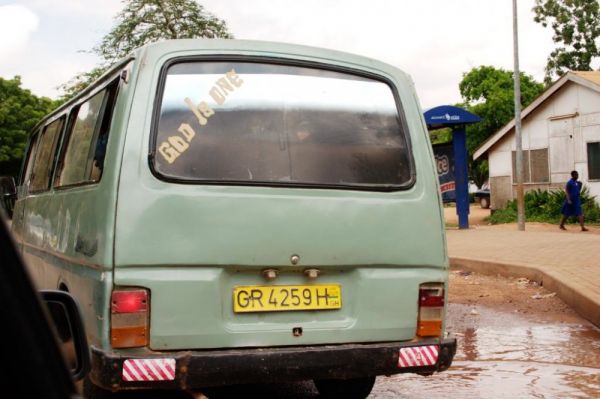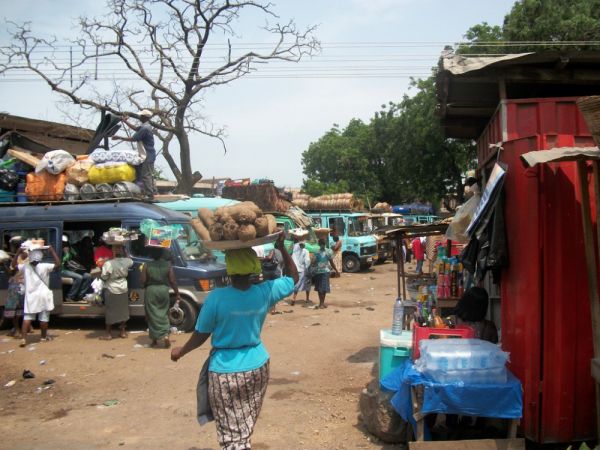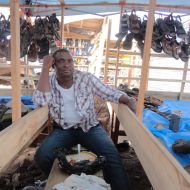“Work-for-Pay” System Lets Young Cabbies Drive Now and Buy the Taxi Later

God may love you, but he won’t buy you a cab. For that, Accra’s aspiring drivers turn to the “work-for-pay” system. Photo credit: Chris Wilson via Flickr Creative Commons
The lines of text emblazoned across the backs of Accra’s trotros (minibuses) and taxis impart an inventive, sometimes puzzling kind of wisdom that invites philosophical discussion:
“Fear Woman…”
“Big Man? Love Your Wife”
“Time Changes”
And, my personal favorite of the moment: “Extra O.J.” written across the front. As the trotro pulls away, you can see the punch line on the back end: “Extra Ordinary Jesus.”
In 1971, Nadine Gordimer wrote of these slogans, “One gets into the habit of looking for omens – a private text-for-the-day, a warning – as one moves around Accra.” It’s true. A few days ago I was in the car with a friend when a big trotro pulled out right in front of us, accelerating with all the speed of an aged, overloaded passenger van with smoke belching out the rear. My friend swore as he hit the breaks and downshifted while the swaying trotro lumbered into traffic, trapping us behind it. I pointed at the vehicle’s back window and wryly repeated its slogan: “Patience Moves Mountains.”
Some of the slogans are inside jokes, hinting at a cultural repertoire a foreigner like me will never have full access to. The single word Elosaf on the back of the occasional taxi has been one of these for me, a familiar mystery that surrounds me every day until I’ve forgotten it entirely, something maybe someday I’ll get around to asking someone about. Yesterday I unintentionally solved the forgotten mystery: Elosaf, it turns out, is a company, one of the solutions to a problem of social mobility.
“You see that car over there?” says Nii Odzenma Okpoti, the Secretary of the Burma Camp Taxi Drivers Union, pointing. “That’s an Elosaf car.” We’re sitting in 37 Station, where taxis are lined up for the shared taxi services that run along fixed routes underserved by trotros. A wall now stands where there used to be a string of small businesses owned by local women: The AMA has been busy. Near the wall, I see a car whose back window is indeed printed with letters spelling Elosaf.
Elosaf, Nii told me, is one of a few companies who have taken up and formalized a growing informal credit system called “work-and-pay” that is giving more and more people access to the taxi driving business.

Trotros awaiting passengers in Accra. Photo credit: Sigma Beta
Informal networks have long been the way into this business for people who don’t have the means to buy a car. A parent, a wealthy uncle or a successful sibling might buy you a car to drive, sometimes giving it to you outright, other times selling it to you on a loan or payment system. Or perhaps someone would buy a car and find a driver to pay them a certain amount each day out of their earnings, with the car remaining the property of the original purchaser.
But under the work-and-pay arrangement, drivers enter an agreement with the car’s purchaser much like a “rent-to-own” system. They pay the owner a set amount each day, generally five or six days a week, ranging from 20 to 40 Ghana cedis ($10-20 USD). After two-and-a-half to four years, the driver owns the car. According to Nii, the system first started to become popular about 20 years ago, and is now a common entry point for young people getting into the business. “It’s good work if you manage yourself well,” says Nii. And a system that started out as informal arrangements between individuals has been successful enough to grow into formal businesses like Elosaf.
Moses Quarshie, 51, one of the Elosaf drivers, has owned his car for two years now. He praises Elosaf, which he says is owned by a Ghanaian man who lives in Norway. “He’s been very good to us,” Moses tells me. He has been driving for 22 years; after training as a mechanic and finding he couldn’t raise the money to open a workshop, he says, “I jumped into driving, where I can get my daily bread.”
Still, he continues, the work-and-pay system is hardly easy. The drivers must come up with 100 Ghana cedis a week for the company, and pay for their own maintenance. If the car breaks down, they may have to go to a friend for a loan to make the payment. And because competition has increased so much – Accra’s streets are packed with taxis and the barriers to entry are quite low – “it’s difficult for us to get the sales.” And then there are the consequences of failing to get enough business. “If you don’t make sales for three weeks,” he says, “they take the car from you.” Moses says a few of his friends have had this happen to them. At that point, the driver has to start over from scratch. Generally, though, Moses says he makes 70 to 100 Ghana cedis a day, a range that the other drivers gathered around seem to agree with.
Emmanuel Amoah, who manages Elosaf, confirmed these numbers. He and the owner, Elo Nii Nii Osafo Francis, have been in business for just over three years, during which time they’ve bought 33 cars. Emmanuel is himself a taxi driver. “Taxi drivers haven’t gotten money to buy our own cars,” he says. With work-and-pay, you can drive a car for a few years, then, “after that, you can manage your own affairs.” Compared with the system where you drive someone else’s car for years without the possibility of ever owning the vehicle, he thinks this is a much better deal for drivers.
Midlands Bank, says Nii Okpoti, is another formal-sector player that has gotten involved in work-and-pay. Rather than issue loans for cars, they buy cars to lease out to drivers under the work-and-pay system. Credit in Ghana still isn’t easily available, especially unsecured credit. This gives banks the security of actually owning the vehicles outright and essentially selling them on an installation payment system.
Even as the formal sector has gotten interested in work-and pay, the organization of the informal sector has also been a key factor in giving drivers access to it. The taxi unions themselves, says Nii, act as guarantors for drivers they know who want to get into the work-and-pay system. Isaac Kygremeh agrees with Moses. Known as “Commander” for his and his family’s military service, Kygremeh is one of the drivers sitting around the drivers’ little relaxation area, a few benches around a table shaded by a red Vodafone umbrella.
“I think this work-and-pay is good if you manage it,” he says, adding that it’s best for young drivers willing to work hard in order to attain independence. He explains how well the drivers know each other: “We work together, we play together, sometimes we eat together.”
“When you are in an organized union,” says Nii, “it helps. Because we get to know the character of the people.” I’m reminded of another popular taxi slogan: “Trust no one.” Among these drivers, trust, paradoxically, is a key to success.









